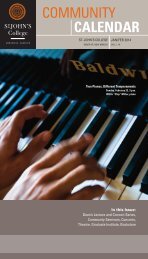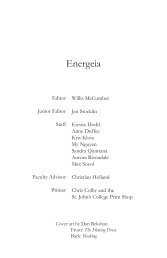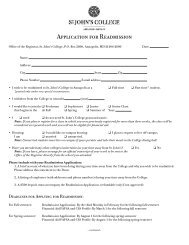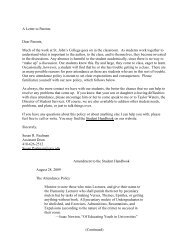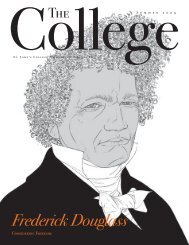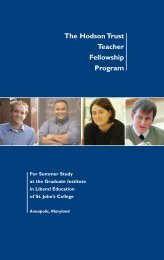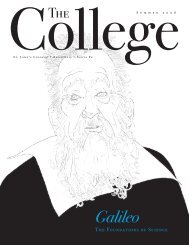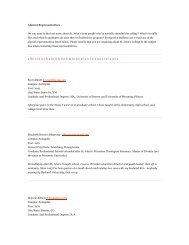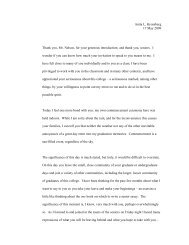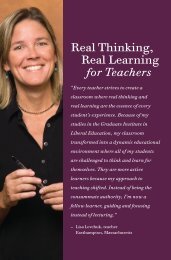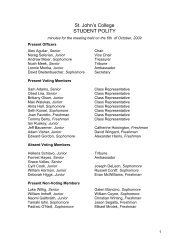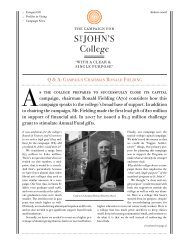âTo Meet with Macbeth,â given by tutor Louis ... - St. John's College
âTo Meet with Macbeth,â given by tutor Louis ... - St. John's College
âTo Meet with Macbeth,â given by tutor Louis ... - St. John's College
You also want an ePaper? Increase the reach of your titles
YUMPU automatically turns print PDFs into web optimized ePapers that Google loves.
Banquo’s ghost, seated and moving among the guests, brings into the open the two sides of<br />
<strong>Macbeth</strong>’s tyranny. People are as unreal as ghosts to this tyrant: his power learns how to make them<br />
disappear like shadows and mockeries; and ghosts are as real as people to this tyrant: his power learns<br />
how to order the dead (the monuments of history) to become food for kites. The fear felt <strong>by</strong> the people<br />
for their disappearing lives and families spreads across the land because the fear felt <strong>by</strong> <strong>Macbeth</strong> of his<br />
dead historical rival—twice driven away—and of his living accomplices makes him stalk the land for<br />
more fears to eat. <strong>Macbeth</strong> thus grows bigger, stronger, and more determined. “For mine own<br />
good/All causes shall give way” (III.v.136-137). “Mine own good” includes in its meaning no more<br />
difference between living people and dead people. Both are assailable to <strong>Macbeth</strong>’s appetite for blood.<br />
So he moves forward, across the deepening river of blood to the land of promise—there to be free from<br />
bondage to “saucy doubts and fears” (III.iv.26).<br />
Act IV. The Knower and Doer of Nameless Things.<br />
The next cause to give way in <strong>Macbeth</strong>’s pursuit of his own good is respect for the separate<br />
parts and kinds of things in nature. In order to know deeper things <strong>with</strong>out names, the Weird Sisters,<br />
doing what they call “a deed <strong>with</strong>out a name,” deposit dismembered bodily forms into their cauldron,<br />
where souls come to inquire into things beyond mortal intelligence (IV.i.49). “More shall they speak<br />
[says <strong>Macbeth</strong>], for now I am bent to know/By the worst means the worst” (III.iv.135-136). Knowing the<br />
worst is good for us, too. Is this not why we attend tragedies—to learn the worst things to fear and to<br />
pity from the master playwrights who already know our abiding questions? “Open, locks,/Whoever<br />
knocks!” (IV.i.46-47). <strong>Macbeth</strong> first learns from the armed head that rises <strong>with</strong> thunder from the<br />
cauldron to fear Macduff. He next learns from a bloody child that rises <strong>with</strong> thunder from the cauldron<br />
to “laugh to scorn” the power of any man born of woman (IV.i.79). There is no pity in that laughter,<br />
which he heard at the time of Duncan’s murder, though he did not know then how to appropriate it<br />
from among the other voices and sounds of the night. Now, that laughter is his charm against tragedy.<br />
41



